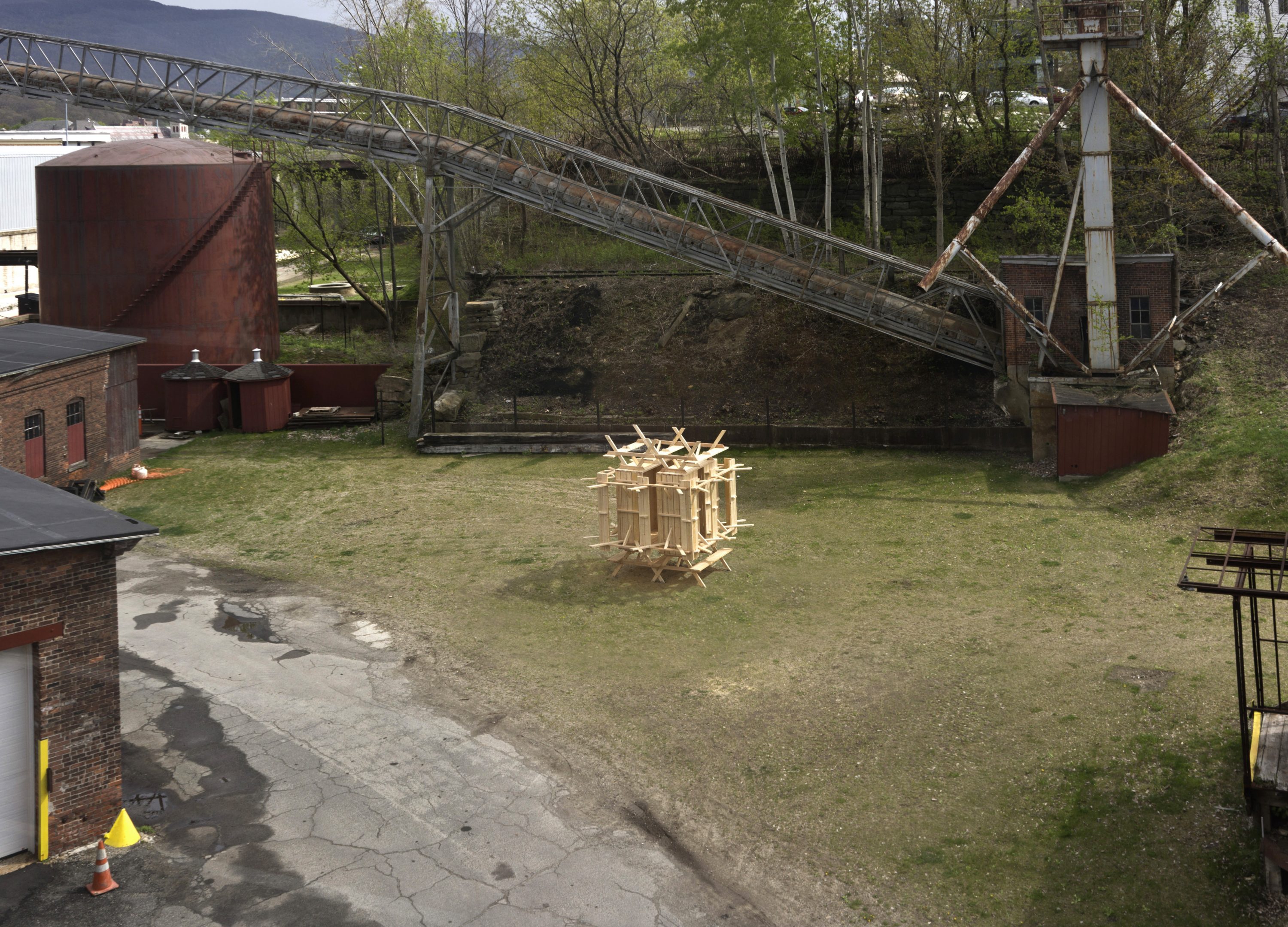Entrevue, Michel de Broin, Etienne Zack
Mass MoCA
Etienne Zack: I see in many of your works classical mechanics or Newtonian mechanics. Since I’ve mentioned Newton (1642–1727), do you have an affinity with that period?
Michel de Broin: I recently carried out a performance involving a lumberjack and a lamppost. The historical movement known as “The Age of Enlightenment” or “Age of Reason,” to which Newton belonged, translates to “the Century of Light” in French, light being a synonym of reason and darkness suspected of belonging to witchcraft and magic. I asked a lumberjack to bring his chainsaw to cut down a lamppost in an urban wasteland. The lamp, standing tall in its abundance of “light,” is brought crashing to the ground, exploding in a bang, and the night moves in. Too much light keeps us from seeing the night. Not everything can be explained with reason, and there are still gray areas to be preserved. This project was perhaps the way I speak in favor of an “ecology of the darkness” that also allows us to enjoy the view of the starry sky.

Photograph by Sarah Went
EZ: At the same time, you work with light. Do you have an interest in quantum mechanics?
MdB: To be involved within the progress of science and quantum mechanics, should we give up our senses and affections that are completely disjoined from the infinitely large or infinitely small phenomena? Modern science owes its success from being fully emancipated from anthropocentrism. Mathematical formulas that describe the physical world are incomprehensible to our external stimuli: our faculties of sight, smell, hearing, taste, and touch. A great loneliness separates man from the world described by science. Even for the more advanced conceptual thinking, sculptures and language are inextricably linked to the world of the senses. Art is an attempt to evoke the world, but there is such a difference between the equations that describe the physical world and the experience we have of things. Scientists will never find a way for man to happily cross the threshold of a black hole; art is for me a way to make black holes that our senses can poetically slip into, escaping the normal order of things.
EZ: In Revolution or Wormhole, did you start by looking at equations in physics? At the Möbius strip? Or rather than starting with theories, did you start with your personal perception of the object itself?
MdB: I looked to a staircase and I wondered how I could address the symbolism generally associated with it simply by changing its form. The staircase can be seen as a symbol of progress, of modern positivist faith. By making a node of it, and creating an infinite path, I questioned the idea of progress and brought the idea of time as a continuous and repetitive cycle, returning upon itself.
EZ: You often oppose forces, energy or elements in your work. In The Great Encounter two fridges “fight it off” or perhaps join forces. In Bleed, and Fuite, electricity is replaced with water. Is inertia where you want to push things?
MdB: Those pieces are about opposite forces joining together, or about setting objects free from their function. Refrigerators are designed to be isolated, but in Great Encounter, to help create a connection between two lonely refrigerators, I constructed a canal between their insides so they could share their intimacy. They cannot work anymore as refrigerators but now they can love. Bleed and Fuite are talking about expenditure, energy loss and failure. In Bleed I have presented a power drill connected to an outlet; as a result of a suicidal act it bleeds water from five small holes. The drill dies as a functional object and begins a new happy second life as a fountain.
EZ: Would you agree that movement and inertia are central themes in your work?
MdB: They are not themes but processes. Inertia for me sounds conservative and so I prefer to talk about resistance, also because resistance produces heat. I like to see the heat produced from resistance as freely escaping from the system. According to the thermodynamic law, heat loss generated from resistance to a system cannot be recaptured and is liberated freely into the universe; this energy shows that there is an “exteriority” to our system.
EZ: Do you sometimes think of your work as equations?
MdB: No . . . but when I was quite young my older brother was doing a Master’s in mathematics, and I remember being fascinated seeing him fill pages with calculations. He described the level of abstraction he was able to express without the use of common language. Symbols and numbers are able to express the complexity in formulas that simultaneously synthesize the whole; something that written language cannot do without a very long and tortuous description. Intuition can hold complexity, but I feel my intuition exists without or before language, and is fleeting unless it takes form in a process. All my hard work is to translate ideas, so they can be shared with others; since I don’t know much about mathematics, I use miscellaneous thought, odds and ends, found objects and discourse to translate my intuition into an aggregate of percept and affect. The condensed objects made of sensation and stolen components start to speak by themselves and have their own life that is derived from my first intuition.
EZ: Tell me more about Molecule and Black Whole Conference.
MdB: I was invited to a school for a workshop, I took all the chairs away from the students and created a geometric whole around which, without their chairs, they had no choice other than to gravitate. I call the work Molecule because it was made by agglomeration. It became my sculpture and they lost their chairs forever. When I started drawing Black Whole back in 2003, it was during the war in Iraq, and at the time a lot of my works were weapons or shelters. Black Whole is made of 74 chairs, it is designed to use centrifugal force to abrogate hierarchy and create an immune system protecting the inside against the outside.
EZ: I see in your work a resistance to the daily physical realities we all encounter. Do you have the will to subvert the “weighty” daily experience?
MdB: Indeed, I look to play and cunning to develop any kind of alternative to interrupt the deadly boredom that links the normality to the reality.
